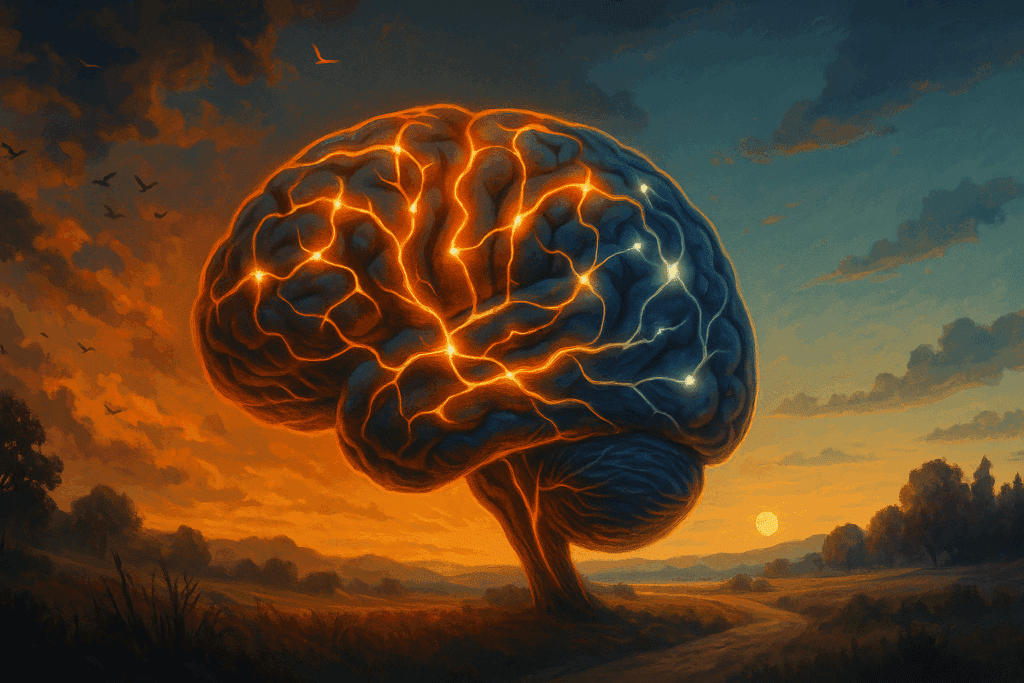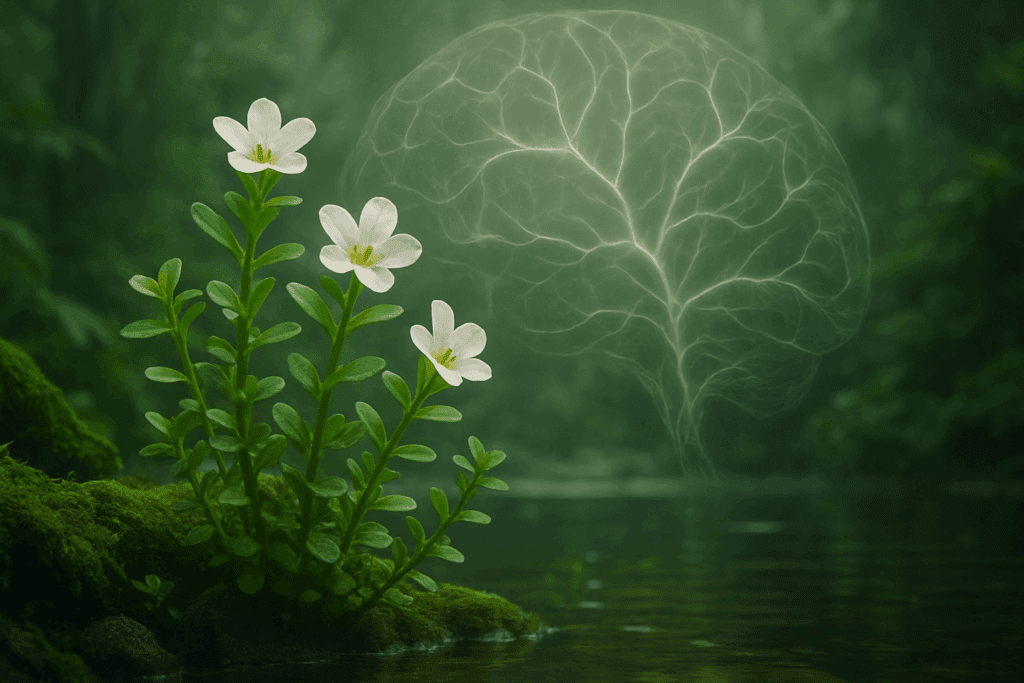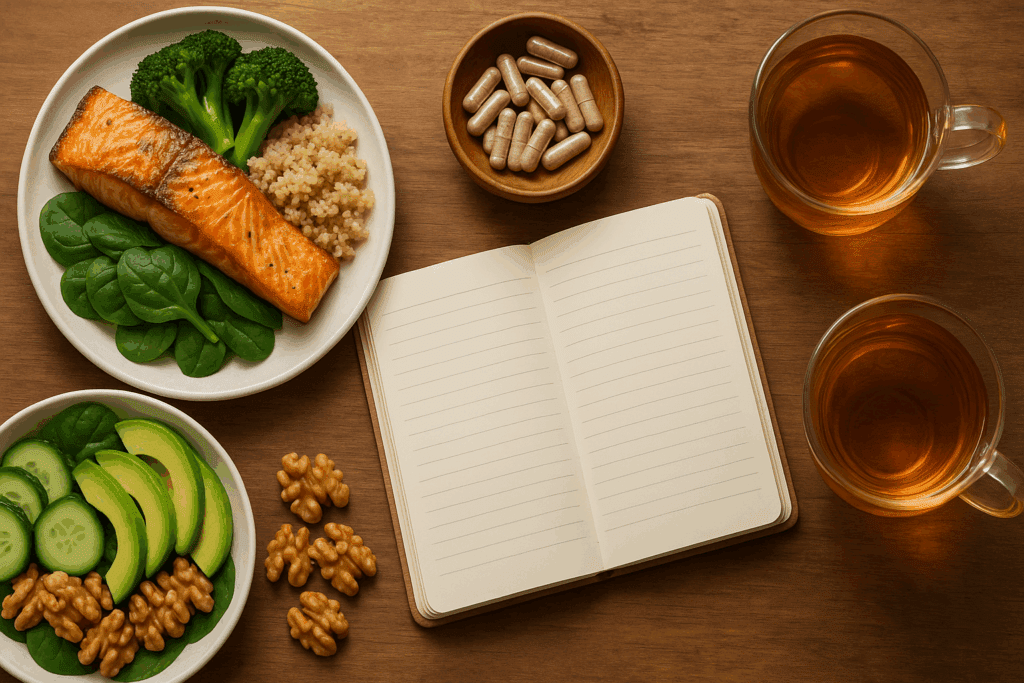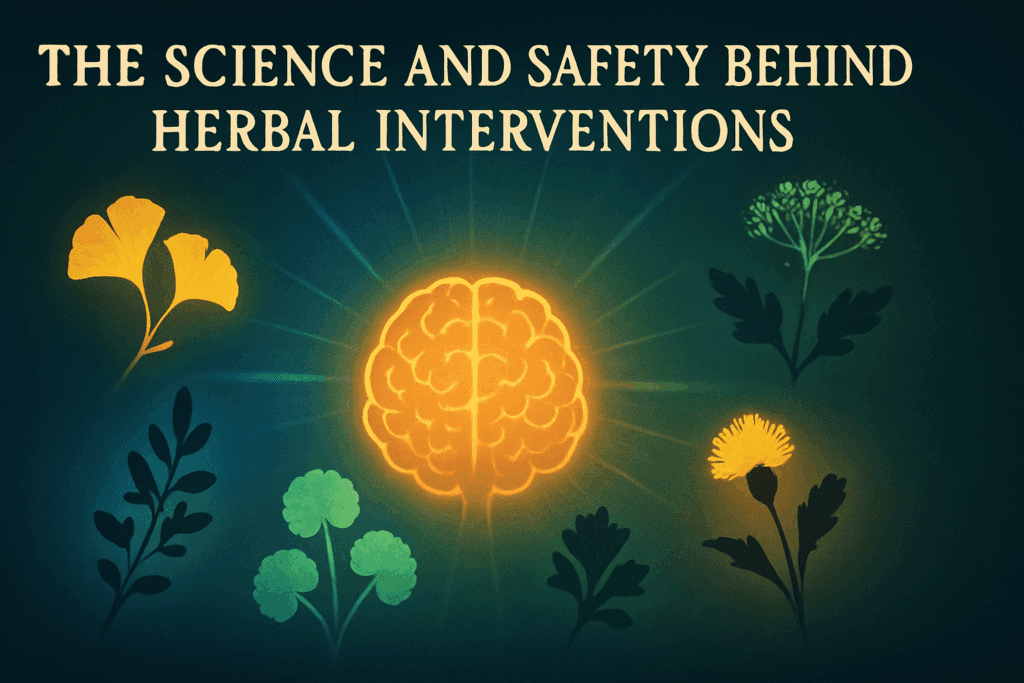Attention-deficit/hyperactivity disorder (ADHD) is a complex neurodevelopmental condition that affects both children and adults, presenting with challenges such as inattention, impulsivity, and restlessness. While pharmaceutical options like stimulants are commonly prescribed, many individuals and families are seeking complementary or alternative therapies to support cognitive clarity and emotional regulation without the risk of side effects associated with long-term medication use. Increasingly, science has begun to explore the efficacy of natural herbs and plant-based compounds for managing ADHD symptoms—offering new hope and possibilities for holistic mental health support.
You may also like: Best Herb for ADHD Support: How Natural Remedies and Herbs for ADHD Women May Help Boost Focus and Calm
Understanding ADHD Through the Lens of Brain Chemistry
To appreciate how herbs might support ADHD management, it is essential to understand the neurochemical landscape of the condition. ADHD has been strongly linked to dysregulation in dopamine and norepinephrine pathways in the brain. These neurotransmitters are critical for sustaining attention, filtering distractions, and managing executive functions like memory, organization, and impulse control. When these pathways are underactive or imbalanced, individuals may struggle with staying focused, remembering important tasks, or even recalling where they put something—a common frustration that drives many to wonder how to remember where you put something or how to remember where u put something more effectively.
Traditional pharmaceutical treatments aim to correct these imbalances by increasing dopamine availability in the brain, but they are not without drawbacks. Side effects such as insomnia, anxiety, appetite suppression, and cardiovascular concerns are common, prompting growing interest in natural substances that might offer more gentle, sustainable support. This is where herbs step in as potentially valuable allies.

Ginkgo Biloba: The Circulatory and Cognitive Enhancer
Ginkgo biloba has long been studied for its impact on memory and cognitive function. As one of the oldest living tree species on Earth, its fan-shaped leaves harbor potent flavonoids and terpenoids, compounds known for their antioxidant and anti-inflammatory properties. By increasing blood flow to the brain and enhancing oxygen delivery, ginkgo biloba may support memory recall and sharpen mental clarity. For individuals with ADHD, these effects could contribute to improved working memory and reduced mental fog.
Clinical trials have begun to support ginkgo’s use in attention-related disorders. In combination with other supplements or used as an adjunct to prescription treatments, ginkgo has demonstrated potential in improving attention span and cognitive performance. More importantly, for individuals who find themselves constantly losing items or forgetting tasks, ginkgo biloba may play a role in boosting the neural pathways that help you remember where you put something—a function of spatial memory and executive processing that is often impaired in ADHD.
Rhodiola Rosea: Adaptogen for Mental Resilience
Another herb gaining scientific traction is Rhodiola rosea, an adaptogen traditionally used in Siberian medicine to combat fatigue and enhance stamina. Adaptogens are a class of herbs known to help the body adapt to physical and emotional stress, and Rhodiola does this by modulating stress hormones like cortisol and improving cellular energy metabolism.
For individuals with ADHD, Rhodiola’s ability to reduce fatigue and mental exhaustion while enhancing alertness makes it a promising natural intervention. Its cognitive benefits extend to better focus, reduced brain fog, and an improved ability to complete tasks—qualities that are crucial for anyone struggling to stay organized or remember daily responsibilities. It is no surprise that those searching for strategies on how to remember where you put something might find Rhodiola particularly helpful.

Bacopa Monnieri: Ayurvedic Tonic for Brain Function
Bacopa monnieri, also known as Brahmi in Ayurvedic medicine, has a long-standing reputation as a brain tonic. It has been extensively studied for its nootropic properties—specifically, its ability to enhance memory formation, retention, and learning. Bacopa contains compounds called bacosides that are believed to support neuron communication, protect synaptic functions, and reduce oxidative stress in the brain.
In randomized controlled trials, Bacopa has demonstrated significant improvements in memory retention and recall speed in both children and adults. For individuals with ADHD, especially those dealing with forgetfulness or misplaced items, the herb’s impact on working memory can be profound. Its gentle calming effects also make it suitable for those with coexisting anxiety, which is common in ADHD presentations. When used consistently, Bacopa can help reinforce the kind of mental organization needed to remember where you put something or even how to remember where u put something in the chaos of daily life.
Gotu Kola: The Mind-Body Connector
Gotu kola is another adaptogenic herb often overlooked in Western discussions of ADHD, yet it holds significant potential. Known for its dual ability to calm the nervous system while enhancing mental acuity, Gotu kola has been used for centuries in both Chinese and Ayurvedic medicine to promote clarity of thought and emotional balance.
Recent studies suggest that Gotu kola can help repair and protect brain cells, stimulate the growth of neural connections, and increase antioxidant levels in the brain. These actions collectively support memory, focus, and learning. In the context of ADHD, Gotu kola may be especially helpful for managing the emotional ups and downs that interfere with concentration. Its subtle balancing effects can make the difference in helping someone recall where they placed their keys or how to remember where you put something when routines are disrupted.

Panax Ginseng: Energizer of Mental Stamina
Panax ginseng, often referred to as true ginseng, is another adaptogen recognized for its ability to improve cognitive function, reduce mental fatigue, and increase resilience to stress. Research has shown that ginseng may support memory, executive function, and attention span, making it particularly valuable for individuals experiencing symptoms of ADHD.
By stimulating the release of neurotransmitters such as dopamine and acetylcholine, Panax ginseng enhances neural signaling, which plays a vital role in sustaining focus and processing information. These effects may be particularly useful for those who frequently find themselves wondering how to remember where you put something or how to remember where u put something, as improved neurotransmission can reinforce habit-forming memory loops.
Lion’s Mane Mushroom: The Neurogenesis Stimulator
While not technically an herb, Lion’s Mane mushroom has earned its place among the top natural nootropics for brain health. This medicinal mushroom contains compounds known as hericenones and erinacines, which stimulate the production of nerve growth factor (NGF)—a protein essential for the growth and survival of neurons.
In the context of ADHD, Lion’s Mane may offer a unique benefit by actually promoting neurogenesis, or the creation of new neurons. This could lead to long-term improvements in memory, mood, and cognitive flexibility. Early studies and anecdotal reports suggest that consistent use of Lion’s Mane can lead to clearer thinking, improved task execution, and fewer instances of forgetting where something was placed. The mushroom thus becomes an intriguing tool for those seeking how to remember where you put something on a consistent basis.
Valerian Root and Passionflower: Calming the Hyperactive Mind
For individuals whose ADHD presents primarily as hyperactivity and restlessness, calming herbs such as valerian root and passionflower may provide welcome relief. Both of these herbs are known for their sedative properties, and they work by increasing gamma-aminobutyric acid (GABA) activity in the brain. GABA is a neurotransmitter that inhibits excessive neural firing, promoting a state of calm without impairing cognition.
While these herbs may not directly enhance memory or focus in the way that ginkgo or Bacopa might, they play an important role in reducing the anxiety and agitation that often derail concentration. A more peaceful mental state makes it easier to develop consistent organizational habits, which is an essential part of learning how to remember where you put something or how to remember where u put something reliably.

Synergistic Strategies: Diet, Lifestyle, and Herbal Combinations
No single herb is a magic bullet for ADHD, and the most effective strategies tend to be multifaceted. Combining the cognitive benefits of herbs with evidence-based lifestyle interventions such as structured routines, mindful breathing, physical activity, and nutrition can dramatically improve outcomes. A diet rich in omega-3 fatty acids, antioxidants, and magnesium supports overall brain function and provides a strong foundation for any herbal regimen.
When using herbs, synergy matters. For example, combining ginkgo biloba with Panax ginseng has been shown to enhance working memory and attention span more effectively than either herb alone. Likewise, pairing Bacopa with Rhodiola can promote both mental calm and alertness. These combinations can be especially useful for those aiming to optimize memory performance and develop techniques for how to remember where you put something consistently, even under stress.
As interest in integrative approaches to ADHD grows, it becomes increasingly important to consult qualified professionals who understand both the medical and herbal landscapes. Herbs can interact with medications, and dosages must be tailored to individual needs. A trained herbalist or integrative health practitioner can help design a safe and effective protocol tailored to the unique neurobiology of each individual.
The Science and Safety Behind Herbal Interventions
Scientific validation is crucial for any therapeutic intervention, especially when addressing complex conditions like ADHD. Fortunately, the body of research supporting herbal treatments is expanding. Double-blind, placebo-controlled studies have confirmed the cognitive benefits of herbs like Bacopa monnieri, Ginkgo biloba, and Panax ginseng. Animal models have also demonstrated the potential of Rhodiola and Gotu kola in enhancing memory, attention, and stress resilience.
Nevertheless, not all studies are created equal. Differences in herb quality, dosage, extraction methods, and individual metabolism can affect outcomes. That is why it is vital to use high-quality, standardized extracts from reputable sources. Look for supplements that are third-party tested for purity and potency. Individuals should also monitor their responses carefully, noting both benefits and any side effects, and adjust accordingly in consultation with a healthcare provider.
It is worth emphasizing that herbs work best when integrated into a comprehensive wellness plan. They are not meant to replace medical treatment for ADHD, especially in cases where symptoms are severe or impairing. Instead, they can serve as complementary tools that empower individuals to take a more active role in their cognitive health.
The Role of Memory Training and Neuroplasticity
In addition to herbs, cognitive training strategies designed to enhance neuroplasticity—the brain’s ability to reorganize and adapt—can improve memory and focus. Games and exercises that target working memory, sequencing, and spatial awareness help strengthen neural circuits that are often underdeveloped in individuals with ADHD. These tools, when used alongside herbal remedies, can create a powerful synergy.
This is particularly valuable for individuals who are trying to improve their ability to track belongings, follow routines, and manage distractions. In this context, herbs become part of a larger framework that teaches the brain how to remember where you put something, not just once, but reliably over time. Neuroplasticity supports the formation of habits, and herbs support the mental clarity needed to form those habits consistently.

Frequently Asked Questions: Natural Herbs and Cognitive Health for ADHD
What role does emotional health play in cognitive recovery for individuals with ADHD?
Emotional health is a critical yet often overlooked factor when considering how to recover from cognitive impairment, especially in people with ADHD. Chronic stress, emotional dysregulation, and anxiety can suppress the brain’s ability to form new neural pathways, which are necessary for memory, focus, and emotional resilience. Healing cognitive functions requires emotional regulation strategies such as mindfulness practices, therapeutic interventions, or even supportive relationships to buffer against stress-related brain inflammation. For anyone seeking how to reverse cognitive decline, stabilizing emotional health becomes a foundational component. Long-term cognitive resilience, especially in ADHD populations, is built not just through supplements or nootropics, but through consistent emotional nourishment and self-awareness practices.
Can environmental changes influence how to prevent cognitive decline in ADHD?
Yes, environmental changes can significantly impact how to prevent cognitive decline, particularly for individuals with ADHD who are sensitive to sensory and structural chaos. Creating an environment that reduces clutter, provides clear visual cues, and minimizes distractions can help reinforce memory cues and enhance executive function. Research shows that exposure to nature, natural light, and organized spaces fosters neuroplasticity and cognitive flexibility. These elements train the brain to form associations and routines that support mental clarity. When individuals live in environments that reduce cognitive overload, they are less likely to misplace items or experience ongoing memory lapses, which is essential when learning how to recover from cognitive impairment effectively.
How do social habits and relationships affect cognitive outcomes in ADHD?
Social interactions can profoundly affect brain health and cognitive function, especially in ADHD where impulsivity and social challenges are common. Individuals seeking how to recover from cognitive impairment often benefit from stable social environments that encourage constructive feedback and healthy routines. Group-based therapies, peer accountability models, and structured support groups have been shown to enhance memory retention and emotional regulation. Engaging in social learning environments helps reinforce memory through repetition and shared experience, crucial components in how to reverse cognitive decline. Moreover, feeling socially connected may reduce cognitive fatigue, promote self-worth, and help prevent the progressive erosion of mental sharpness.
Are digital tools effective for supporting ADHD memory function?
Digital tools, when used strategically, can be a powerful ally for those figuring out how to prevent cognitive decline and support executive function. Apps that offer reminders, visual schedules, habit tracking, or digital journaling help externalize cognitive load, freeing the brain for higher-level tasks. These tools also support those exploring how to recover from cognitive impairment by reinforcing routine and spatial memory, such as apps that log item locations or offer location-based reminders. Furthermore, biofeedback and brain-training software have shown potential to enhance working memory and focus in ADHD populations. With the right customization and oversight, technology can be a bridge to stronger cognitive health rather than a distraction.
What lifestyle changes support how to reverse cognitive decline naturally?
Natural cognitive recovery is not limited to herbs and supplements—it thrives on sustainable lifestyle changes. Prioritizing quality sleep, nutrient-dense meals, and regular physical activity creates the biological environment needed for neuroregeneration. Aerobic exercise increases hippocampal volume, while sleep consolidates memory and clears neural waste. These physiological mechanisms are integral when determining how to reverse cognitive decline with lasting effects. Additionally, adopting structured daily routines helps establish mental habits that compensate for executive dysfunction commonly seen in ADHD.
How does creative expression contribute to cognitive recovery in ADHD?
Creative practices such as music, art, and journaling can powerfully influence how to recover from cognitive impairment in a more holistic way. These activities activate different brain regions, encouraging cross-hemispheric communication and promoting neuroplasticity. Individuals with ADHD often thrive in expressive modalities because they bypass rigid cognitive pathways and allow for freer self-regulation. Over time, creative engagement has been linked to improved memory, focus, and emotional insight, making it a valuable addition for those exploring how to prevent cognitive decline without relying solely on pharmaceutical or supplemental routes. Engaging with the arts may offer a therapeutic feedback loop where expression reinforces self-awareness, which in turn supports better cognitive control.
Can neurofeedback therapy help in ADHD-related memory challenges?
Neurofeedback is an emerging field that offers a non-invasive method of training the brain to self-regulate, and it shows growing promise for ADHD and cognitive support. This technique involves measuring brainwave activity in real-time and giving visual or auditory feedback to encourage more desirable patterns. Over time, neurofeedback has helped many users learn how to reverse cognitive decline by improving attention regulation, sleep quality, and impulse control. It is especially beneficial for those whose cognitive impairment stems from brainwave irregularities rather than structural damage. With professional guidance, neurofeedback offers a customizable and drug-free pathway for individuals seeking how to recover from cognitive impairment while enhancing memory and focus.

What role does gut health play in preventing cognitive decline for ADHD individuals?
Emerging research in the gut-brain axis highlights the profound impact of gut microbiota on cognitive and emotional health. Dysbiosis, or microbial imbalance, can contribute to systemic inflammation and reduced neurotransmitter availability—especially dopamine and serotonin, which are critical for attention and memory. Probiotics and prebiotic-rich foods are now being studied as part of broader protocols aimed at those interested in how to prevent cognitive decline through integrative means. Additionally, certain gut-friendly diets like the Mediterranean or fermented food-based diets have been shown to support mental clarity and reduce ADHD symptom severity. This makes gut health a key player for those on the path toward understanding how to recover from cognitive impairment from the inside out.
Are there generational or age-specific strategies for reversing cognitive impairment in ADHD?
Yes, strategies to support cognitive recovery vary by age group. Children may respond more strongly to behavioral interventions and nutritional protocols, while adults might benefit from mindfulness practices, herbal supplements, or even career restructuring to reduce cognitive load. For older adults with ADHD or age-related memory issues, the focus often shifts toward neuroprotective strategies such as omega-3 supplementation, cognitive puzzles, and cardiovascular health. Across all ages, sleep and social support remain critical pillars in figuring out how to reverse cognitive decline effectively. Tailoring these strategies to developmental stages can lead to more targeted and sustainable results in how to recover from cognitive impairment at any point in life.
What is the future of herbal nootropics in cognitive recovery for ADHD?
The future of herbal nootropics in ADHD and cognitive health lies in greater personalization and scientific rigor. Advances in genomics and metabolomics may soon allow individuals to understand how their bodies uniquely metabolize herbs like Bacopa, Rhodiola, or Lion’s Mane. This could help refine protocols for those seeking how to reverse cognitive decline using precise, bio-individualized regimens. Furthermore, newer formulations are being designed to cross the blood-brain barrier more efficiently, increasing bioavailability and reducing side effects. As clinical trials continue to explore their mechanisms of action, herbs may become a cornerstone in how to recover from cognitive impairment without sacrificing quality of life or personal agency.
Conclusion: Choosing the Right Herbal Path to Focus and Clarity
The search for the best herb for ADHD is ultimately a journey through personalized medicine, one that must be informed by scientific evidence, individual biology, and lifestyle context. While herbs like Bacopa monnieri, Ginkgo biloba, Rhodiola rosea, Gotu kola, and Lion’s Mane offer significant promise, their true value emerges when they are woven into a comprehensive plan that includes nutritional support, behavioral strategies, and professional guidance.
For those struggling with forgetfulness or executive dysfunction, these natural allies may do more than improve focus—they can help rewire the mind toward clarity and intentional living. Whether your goal is to support your child through school challenges or to improve your own productivity as an adult, understanding how to remember where you put something or how to remember where u put something is more than just a matter of memory; it’s a matter of empowerment through holistic brain care.
With science increasingly validating what traditional medicine has long known, the future of ADHD support may indeed be as much about roots and leaves as it is about prescriptions. The key lies in thoughtful integration, patient experimentation, and a deep respect for both the complexity of the human brain and the healing power of nature.
Further Reading:
Natural Remedies to Strengthen Memory and Concentration


